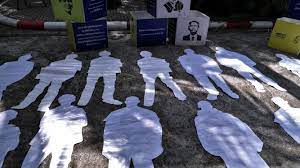On 18 December 1992, the United Nations (U.N) General Assembly adopted a declaration on the protection of all persons from enforced disappearance. The adoption came after increased reports of cases of enforced disappearances in the world, arrest, detention, and abduction which amounted to enforced disappearances. On 21 December 2010, the United Nations General Assembly by resolution 65/209 expressed its deep concern against enforced disappearances. By the same resolution, the Assembly welcomed and adopted the International Convention for the Protection of All Persons from Enforced Disappearances and declared 30 August the International Day of the Victims of Enforced Disappearances.
The National Transitional Justice Working Group (NTJWG) joins the rest of the world in remembering victims of enforced disappearances. Based on our theme “These Wounds do not Heal,” we lament the lack of commitment by the Government of Zimbabwe to address protracted enforced disappearances in the country. Enforced disappearances in the context of Zimbabwe place the disappeared outside the protection of the law and render them extremely vulnerable to gross human rights violations at the hands of their captors. The rights that are typically affected when a person is disappeared include the right to liberty and security of the person, the right not to be subjected to torture and other cruel, inhuman or degrading treatment or punishment, the right to human dignity, the right to health and the right to life. The effects of enforced disappearances breed secondary victims who suffer from vicarious trauma, especially those close to the disappeared such as the victim’s relatives and friends.
Reminiscing on the history of our country, one is reminded of the thousands of people who disappeared during Gukurahundi at the instigation of the State. From then on, enforced disappearances have characterised every election cycle. On this day, we are reminded of the disappearance of Rashiwe Guzha (disappeared May 1990), Marceline Dzumbira (abducted in the early 90’s), Patrick Nabanyama (disappeared 19 June 2000), Paul Chizuze (disappeared 8 February 2012), Itai Dzamara (disappeared on 9 March 2015). The cross-cutting cause of these disappearances was the consolidation of political power.
The NTJWG stands in solidarity with families, friends, and colleagues of all victims of enforced disappearances. Sadly, enforced disappearances are still a common trend in the country. During the 23-24 August harmonised elections, the NTJWG noted the use of enforced disappearances to suppress the rights of freedom of expression, association, and freedom of assembly. An illustration is the enforced disappearance of Citizens Coalition for Change (CCC) polling in Maramba-Pfungwe Constituency at Tsika Primary school, Givemore Chari who went, missing at 16:00 hrs on 23 August 2023 and was only found in the early hours of 24 August 2023 severely bruised as a result of torture and assault. This latest example shows the State’s resolve to use enforced disappearances for political expediency.
The NTJWG therefore calls upon:
- The Zimbabwean authorities to publicly denounce and desist from the practice of enforced disappearances;
- The authorities to swiftly respond to all reports of enforced disappearances, to completely eradicate this despicable practice from society;
- Members of the public join the rest of the world in demanding the prompt release of all victims and the prosecution of the perpetrators of the disappearances.
Until these demands are met “The wounds do not heal.”
Post published in: Featured


